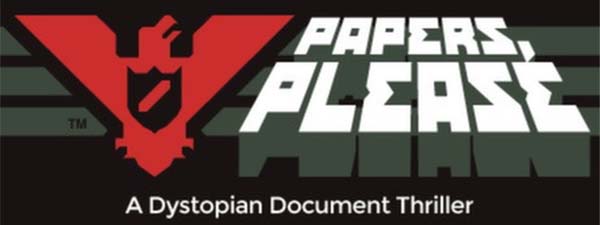
With Dark Souls III behind me, and while I wait for the inevitable time-eater that will be Civilization VI, I wanted to go back through my backlog of smaller games. Papers, Please is a simple little indie title that has been out for almost three years (at the time of this writing), and has been sitting in my Steam library, unplayed, for quite some time. Now seemed like as good a time as any to rectify that.
I just paid to go to a second job that I don't get paid for
Papers, Please is a funny little game in that it is so dedicated to its theme that the game actually does start to feel almost like a real job. You have to click and drag to open up documents, sort through papers, check dates, make sure the document was issued in a valid city, and so on. It's a lot of mundane work, and if you miss any little detail, then you have an omniscient boss who will print out a citation. I quickly came to anticipate the sound of a citation being printed with a Pavlovian anxiety after sending applicants through, even for the ones whose documents I thought I had thoroughly checked. You get two warnings before your omniscient boss starts docking your pay, which keeps constant pressure on you to try to be as close to perfect as possible. Paying for this game is almost like paying for a second job that you, yourself, don't get paid for. And it's kind of a shitty job, at that.
It's not just the potential immigrants' problems that you have to think about. You have your own problems. Every day, you go home with a measly salary, and you have to pay daily for rent, heat, and food for yourself and your family. Maybe you kids or wife get sick, and you have to spend some precious extra dollars on medicine that night. And if your pay gets docked for letting in people with invalid passports, then you might have to go that night without food or heat or medicines, which will just make your family more likely to get sick.
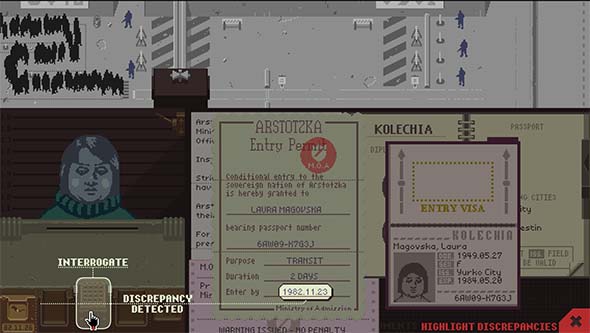
Hooray! A game in which I get to shuffle paper work and perform bureaucratic government functions!
You'll also have people with invalid documents begging to let you in to the country so they can be re-united with their families, or because they're political refugees who will be killed if they go back to their own country... [More]
560b72c3-4d76-45af-9bd1-68ecbaedde74|0|.0
Tags:Papers Please, indie gaming, 3909, Lucas Pope, immigration inspector, passport, customs, checkpoint, bureaucracy, interrogation, puzzle, Arstotzka, war, civilian, terrorism, spy, dystopia, communism, noire, PC, Steam
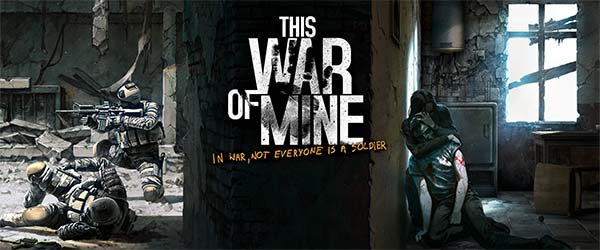
Games have an awkward relationship with war. Most games embrace violence and conflict because they are very easily simulated by computers and mapped to a set of easy-to-understand mechanics. Computers aren't as good at understanding or reacting to speech or emotion as they are at allowing a character to move around in a space and at tracing the path of a bullet or artillery shell. So when a game is about war, it's almost always told from the perspective of a soldier, someone actively participating in the war. And that character's participation is usually presented as noble and honorable, with the people that you are shooting being given little - if any - humanization at all. In many cases, the games will go out of their way to de-humanize the player's opponents by presenting them as literal demons, aliens, or the so-easy-to-hate Nazis.
While there are plenty of examples of games that deal with the behind-the-scenes causes and effects of a war, or the politics of conflict, these elements very rarely appear as central gameplay elements (outside of grand strategy games like Civilization, Total War, or Europa Universalis). Usually, the player plays on the battlefield, and any politics or effects beyond the battlefield are just material for non-playable cutscenes. At best, you might end up with a game that puts the player in the middle of the battle, but which has civilian characters that play a large role in the story.
One of my favorite games of the PS2-era is Ace Combat 4, which is a jet fighter combat game that found a comfortable middle-ground between flight sim and arcade shooter. Its narrative revolved around a child living in an occupied city, who befriends the ace fighter pilot of the occupying nation's air force. The player, however, takes on the role of a nameless, faceless ace fighter pilot belonging to the opposing liberation force. This created a fascinating dichotomy in which your success in missions resulted in defeats for the enemy ace who was the focus of the narrative. He falls into depression and alcoholism as the player systematically shoots down his wingmen and friends, and it served to humanize both sides of the conflict and exposed the human cost of war. One man's victory is the other's defeat. Your own victories became increasingly bittersweet as the game neared its final mission. It was a beautifully constructed scenario that has stuck with me to this day. I suspect that This War of Mine will leave a similar impact on me.
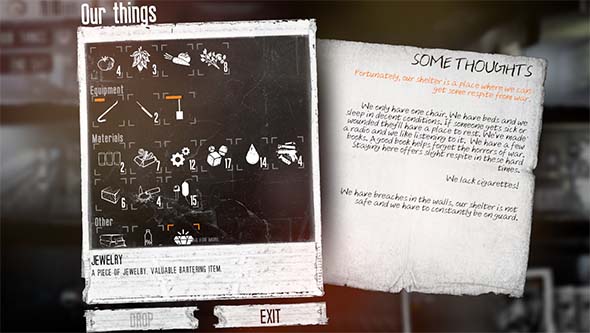
The logistics of keeping your shelves stocked with food and medicine is the primary challenge.
This War of Mine also reminds me of my visit to the Imperial War Museum in Manchester, U.K. this past January. I was really surprised by the difference in presentation that museum had as opposed to most museums that I visit in the United States. Whereas a museum in the U.S. will focus on exhibits of weapons, uniforms, vehicles, battle tactics, and politics behind wars, the IWM was focused primarily around the civilian costs of the two World Wars. It featured exhibits about food and material shortages, how women had to work as battlefield nurses and in factories, and how supplies were moved between cities under siege. It presented the wars as much more personal and ignoble and focused on how it affected people's day-to-day lives, and how the majority of people simply had to live through it. That's the same approach that the Polish studio behind This War of Mine took for their survival game.
Behind the lines
This War of Mine doesn't take place on the front lines or the battlefields. Instead of controlling a soldier, you play as a group of survivors in a rebellious city under siege. You have found a shelled building that you have claimed as a shelter, and every night, you must send one of your group out to scavenge one of various sites around the city for food, medicines, and other supplies to enable your group to [hopefully] survive till the end of the war. In the meantime, those who stay in the shelter must contend with the risk of being raided by other survivors during the night and having your hard-earned supplies stolen from under your own nose - or worse: somebody being hurt or killed.
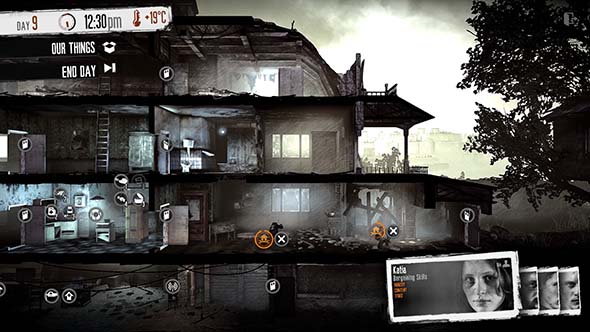
Your close-knit group of survivors must build and defend a shelter and scavenge for supplies.
The result is a game loaded to the brim with choices and consequences. How do your survivors spend their daytime hours? What items do you attempt to craft from your middling inventory of supplies? How do you defend yourself from raids? Do you send your one gun out with your scavenger in case he runs into hostile bandits, or keep it at home to defend your shelter from raids? Who do you send out each night to scavenge? Where do they go? And what do they bring back with them? The "rogue-like" fashion of the gameplay means that there's no undoing and no retries. This, combined with the scarcity of resources, makes every choice, every action, and every death is permanent. This gives a great deal of weight to all those choices that the game gives you.
... [More]
86d552ea-8fe5-4968-9a7d-1d98afbd4919|2|5.0
Tags:This War of Mine, PC, Steam, 11-bit studio, indie gaming, strategy, war, siege, refugee, civilian, survival, rogue
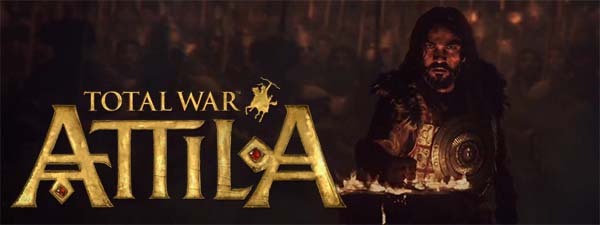
A few months ago, I posted an article outlining some suggestion for unique civilization themes and abilities for a possible Sid Meier's Civilization VI game. In it, I proposed a unique characteristic for the Huns or Mongolians: that they be a true nomadic empire. The idea was that they would have traveling cities that allowed them to move their empire with their army and essentially occupy any unclaimed territory or territory vacated by defeated rivals. Well, the Creative Assembly had already beaten me (and Firaxis) to the punch with Total War: Attila (and apparently Firaxis is embracing the idea with Beyond Earth's first expansion). Total War: Attila has a feature almost identical to what I had conceived for the Huns and Mongolians in Civilization. I'm a fan of the Total War series as is, so I was going to play this game for sure. Of course, Creative Assembly running with an idea that I had independently conceived of only made me more curious to play the game.
Attila acts as sort of a sequel to Rome II. While that game was all about building up the Roman empire (or whichever empire you happened to select), Attila is all about tearing down those empires. But this is a fully stand-alone game (like Napoleon Total War was to Empire Total War), and does not require Rome II in any way.
Learning how to be a horde
The Prologue campaign in this game is brutal! It's like a Demon's Souls tutorial that is designed to kick your ass. I restarted it once before realizing that it was designed for the player to fail in order to teach the new migration feature.
This prologue acts as a tutorial for the new features and mechanics of the game, but it doesn't do a particularly good job of teaching these mechanics. It also doesn't go into much detail of the established features of the franchise (other than telling you that a feature exists, then making you click on the button to do it), so new players might find themselves completely turned off by the fact that they are having their asses handed to them and aren't being taught much about how the game actually works, or - more importantly - why they are failing so hard. Perhaps having two separate tutorial campaigns would have been advisable: one to teach basic Total War concepts of empire and army management; and a second tutorial campaign for experienced Total War players that just teaches the migration features.
The brutal tutorial concludes with the challenging, climactic, historical battle of Adrianople,
in which your Visigoths must hold off Emperor Valens' superior army until your cavalry arrives.
Playing as migratory hordes minimizes city management, but you do still have to develop infrastructure for your nomadic armies. Rebuilding conquered cities and defending your borders, however, is not an issue - which was always the most tedious part of the game anyway. You don't need defensive armies in your territory and are free to focus all your efforts on your eventual goal. This change works well with the requirement that all armies must be attached to generals, and is a big step up from Rome II. There were large chunks of Rome II's campaign in which I felt like I couldn't do anything because I had to camp out my armies in cities in order to replenish and improve public order. Since I was at the army cap, the campaign would stagnate because I couldn't build new armies in order to watch over my newly-conquered settlements while also pressing forward with my primary armies... [More]
da530405-0213-4b1a-93c4-503924d797fd|0|.0
Tags:Total War, Total War: Attila, Creative Assembly, Sega, PC, Steam, Attila, Attila the Hun, Huns, Rome, Western Roman Empire, Eastern Roman Empire, Constantinople, Byzantine Empire, Sassanid Empire, Europe, Goths, Visigoths, Ostragoths, Germanic tribes, Franks, Saxons, Vandals, strategy, turn-based strategy, real-time strategy, grand strategy, history, campaign, horde, migration, climate change, the Great Migration, steppe, Sid Meier's Civilization, war, nomad, siege
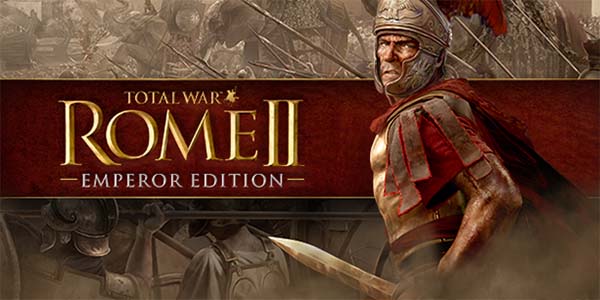
A couple years ago, I wrote an impressions post for Total War: Rome II with a tentative review score of 5 out of 10. I never got around to writing a full review of the game because it remained in a near constant state of flux for over a year after its release. The developers kept adding new DLC ranging from modest culture packs to the tiny Blood & Gore pack. Last year, Creative Assembly released a massive DLC pack that also included across-the-board balance updates and expansion of some of the game's core features. This "Emperor Edition", and its attached Imperator Augustus campaign was free to everyone who bought the original Rome II, and so I decided to give it a try to see if it greatly improved the game.
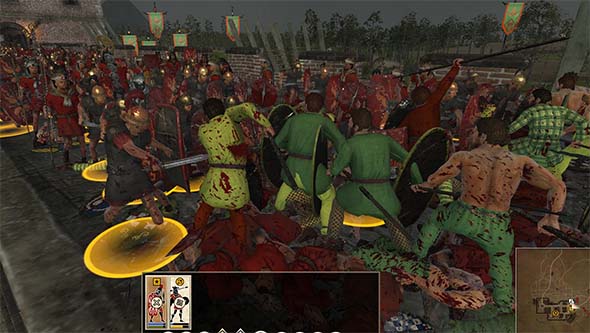
Blood & Gore costs a few dollars extra for those who want it, and increases the ESRB rating to Mature.
Core gameplay has subtle changes
Most of the changes to the core game are subtle, but they do add up to create a more enjoyable experience. The A.I. isn't nearly as bad as it originally was, and naval battles are actually playable now. Building effects have been completely rebalanced in order to avoid the problems with rampant squalor and lack of food that plagued the core game, and the politics systems have been changed to be more active and relevant to the game. Unfortunately, many of these changes are so sweeping, that they break existing campaign save games, meaning that if your version of Rome II was automatically updated, then you lost the ability to continue with any of your previous campaigns.
The most notable changes to empire management is that resources and building upgrades allow for much greater specialization of your various regions. This combined with the rebalancing of squalor and food means that there is incentive to actually upgrade your buildings past the first couple of levels. You also have some more meaningful decisions on what buildings you want to build and upgrade.
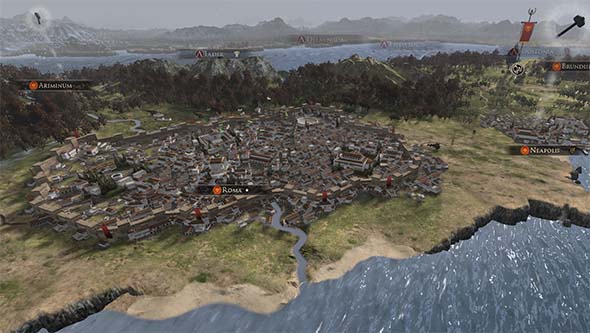
Squalor is no longer an intractable restriction towards building the glory of Rome.
Cities still physically grow on the map as the population grows and more buildings are constructed, and many of the high level buildings can add unique visual flairs to individual cities. It's also informative, since it's easy to see (at a glance) what infrastructure a city might have, which can help you manage your own empire, and can help you to assess the worth of a city for potential conquest.
A.I.s have also been designed to build higher-level settlements and to manage their armies better. Having higher-level buildings means that they have larger armies with more advanced units and better equipment. They provide a much greater challenge, as well as more tempting targets of conquest now. I haven't run into situations in which major factions (Carthage) dissolve into rebellions at the start of the game like I used to see in the base game.
Higher morale means battles last longer
Perhaps the best improvement that's been made by the post-release patches and the Emperor Edition is that the real-time battles are paced much better. Unit morale has been significantly tweaked so that units don't route and flee as soon as they make contact with a superior enemy force. Battles will generally take more than just a couple of minutes to complete, but they still aren't anywhere close to occupying the entire hour that the battle timer allows.
You'll actually have time to move some support units to help out an outnumbered defender before they flee, so there's also a lot more strategy involved in the individual battles. Reserve forces and cavalry flanking maneuvers have more relevance, and generals actually have time to reach front-line units in order to use their powers. You don't have to just clump all your units together in a single wall and ram them into your opponent anymore. You can even engage the enemy with a smaller force if you are stuck having to wait for reinforcements to arrive.
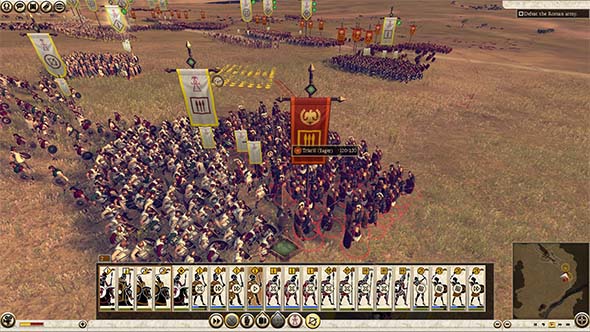
Tactical battles are slower, making cavalry and reserves more relevant, and allowing for more strategic thinking.
Speaking of cavalry, they are actually useful now, since units are generally more responsive to movement commands. In the initial launch version, I found cavalry to be useless because once they engaged an enemy unit, it was almost impossible to disengage without the whole unit getting routed or wiped out. Basically the only thing they were useful for was chasing down enemy skirmishers or flanking artillery. Now, I actually build and use cavalry because they are useful for hit-and-run attacks against regular melee infantry. You still want to keep them away from the pointy end of spears and pikes, but that's to be expected.
I still wish the battles were slowed down a little bit more, but the pacing is a lot better than it was at release. I still rarely see battles last more than 5 minutes of actual fighting, and I still routinely have to pause the game in order to issue orders because unit movement and combat happens so fast ... [More]
457b05a7-62ac-45d9-a1b0-5c8730e665e3|0|.0
Tags:Total War, Total War: Rome II, Rome: Total War, Creative Assembly, Sega, PC, Steam, Europe, Rome, Roman Empire, strategy, grand strategy, real-time stratey, turn-based strategy, history, campaign, war, siege
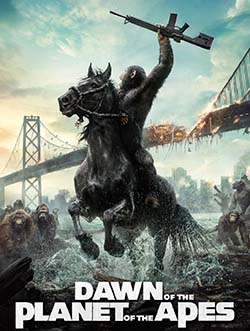
Another good movie in a good year of movies!
This year has been a real treat for my movie sensibilities! Usually, a given year might have one or two high-quality movies that stand above the rest of the dumb summer popcorn flicks. But it's not even August yet, and I've already seen five really good movies. The year started off well with the quirky, sci-fi romance story Her (which I meant to review, but never got around to it). Then, Captain America Winter Soldier turned out to be an exceptional super hero spy thriller. I already reviewed X-Men Days of Future Past and Edge of Tomorrow - both of which I also really liked!
So far, the only disappointment has been the poorly-written Amazing Spider-Man 2 (but this was kind of to be expected, thanks Alex Kurtzman and Roberto Orci). I also have no interest in Transformers 4 or Ninja Turtles, since those both look like standard Michael Bay garbage.
And so we come to Dawn of the Planet of the Apes, a sequel to the prequel / reboot Rise of the Planet of the Apes. Rise was a surprisingly good movie that did an excellent job of humanizing a CGI monkey. Dawn picks up ten years after the last movie ended. The virus that James Franco's character created in the lab as a potential treatment for Alzheimer has spread to the rest of the population and almost wiped out the human race, leaving only the small fraction of people that are genetically resistant to it.
The whole first act of the movie doesn't include a single human character at all, or even any dialogue. Instead, it depicts the ape characters and their culture and social structure, and it really helps to build up the apes as sympathetic characters... [More]
ca38ba6a-ebee-48e3-b58f-6df17015c169|1|4.0
Tags:Dawn of the Planet of the Apes, Planet of the Apes, ape, monkey, prequel, sequel, reboot, science fiction, war, virus, Alzheimer's disease, Caesar, Andy Serkis, Koba, Toby Kebbell, James Franco, silence, sign language
|

| 12 | | | | | | | 60 | | 11 | | | | | | | 55 | | 10 | | | | | | | 50 | | 09 | | | | | | | 45 | | 08 | | | | | | | 40 | | 07 | | | | | | | 35 | | 06 | | | | | | | 30 | | 05 | | | | | | | 25 | | 04 | | | | | | | 20 | | 03 | | | | | | | 15 | | 02 | | | | | | | 10 | | 01 | | | | | | | 05 |
|